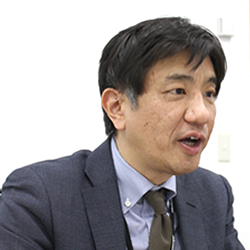 |
 |
| Mr. Mitsuru Katsumata Deputy General Manager Future Logistics Innovation Division Nichirei Logistics Group Inc. |
Mr. Nobuyoshi Tateoka Manager Strategic Planning Division Logistics Network, Inc. |
To promote RPA across the company, we thought it necessary for every employee to feel a sense of "ownership." To give employees an idea of the potential outcomes of RPA, we introduced the system through a series of videos showing internal use cases. We divided the implementation and diffusion of RPA into two stages. . The first stage involved "getting accustomed to RPA" while the second stage was about "achieving results that improve existing work flows and processes". During the first stage, there were no mandatory quantitative targets.
The first stage was set up as "the period of diffusion ". "Business innovation seminars" organized by the company headquarters were held in each office (or site) throughout the country. Over 50 seminars were held with more than 700 employees participating. In addition, an RPA training camp (lasting two nights and three days) for female employees was held. A total of 40 participants gathered from locations across the country to join the camp, which boosted the participants' motivation to develop RPA scenarios. Furthermore, throughout this process we made certain to explain the details on the project to the company board members such as the CEO and heads of the group companies to ensure their understanding of the effects and benefits of RPA. To not isolate the staff responsible for the promotion and implementation of RPA, we focused on creating an environment that allows for the proactive use of RPA.
However, only five staff members were tasked with the company-wide promotion of the RPA system. Their tasks included, but were not limited to, accumulating knowledge, setting up promotional teams, creating guidelines and managing tools, holding training for technical trainers, among others. It was nearly impossible to tend to each task thoroughly with only five staff members. Moreover, since our group companies are located throughout the country, frequent business trips were necessary to provide on-site support. One of the decisive factors that made this project into a success was the partner company that supported us in overcoming these obstacles.
Our efforts resulted in approximately 100 automation scenarios operating in 12 Nichirei Logistics group companies, throughout 94 offices, one year after the full introduction of WinActor. Converting this data to working hours saved per year, we arrive at 10,000 hours cut yearly in the first year. We are currently planning to train up to a hundred employees to become RPA scenario creators, and aiming to reduce the working time through the entire group by an additional 180,000 hours. With the saved time, we would like employees to focus on more "valuable work" as well as to "actively rest" in their free time.
The effect of WinActor was not only time efficiency. Employees themselves began to think about 'how to improve on their work' and 'proceeding to the next step'. The employees' minds were set towards improvement and this led to increased and improved communication with others. Furthermore, by sharing the use cases of other departments or companies, employees started to see the potential applications of these scenarios in their own department. In short, RPA encouraged and motivated our employees to improve the quality of their work as well as increase their efficiency.
To enable RPA for long-term use after its installation, managing RPA scenarios and follow-up support for the project teams were paramount. To manage RPA scenarios, we prepared a cloud-based RPA record book and required employees to register the RPA information (contents, scenarios, operation videos) when using RPA. This RPA record book proved a useful platform to share the RPA information within groups. In addition, to support the project teams, we built an operational flow for creating original scenarios in each department. When creating original scenarios, departments firstly need to share videos of a work flow or process that can be automated. Then, we support them as they take the following steps: training → creating scenarios → follow-up. until the scenarios are put into operation fully.